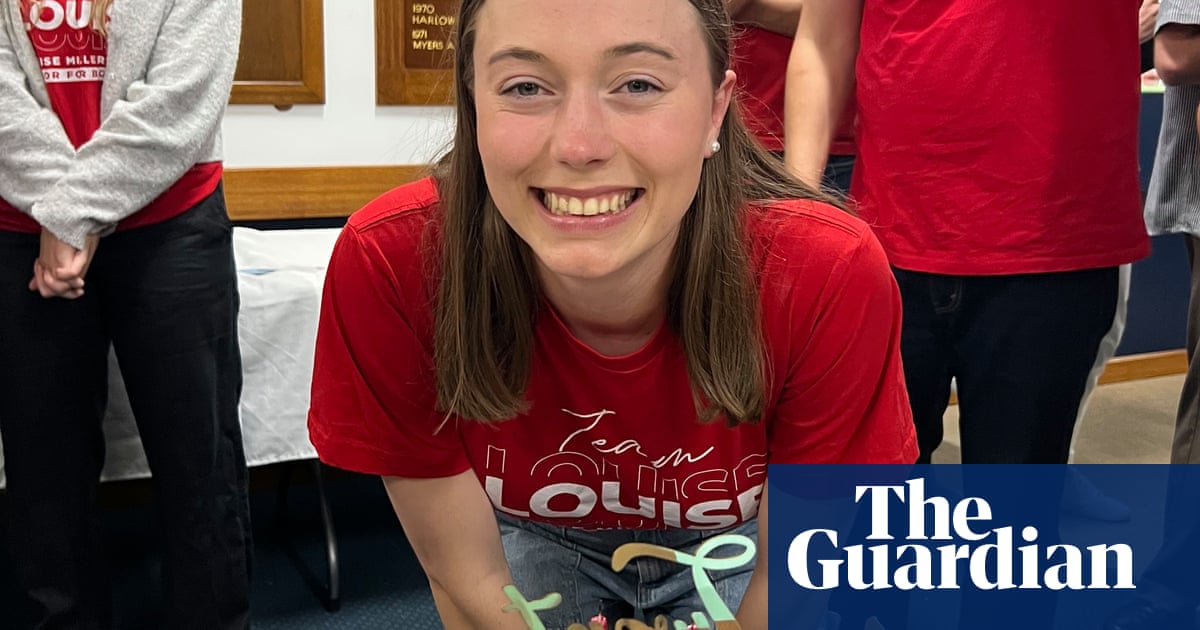The median age of Australia’s federal parliamentariansis 50.
On election night, as the scale of Labor’s victory was revealed, Charlotte Walker was blowing out the candles on her 21st birthday cake.
On Tuesday, she was officially declared a Labor senator forSouth Australiaand became the youngest senator ever elected.
“I’m just taking it a day at a time,” she tells Guardian Australia as she prepares for Senate school in Canberra.
On 3 May Walker worked on polling booths then spent the night in the seat of Boothby, where Labor’s Louise Miller-Frost held out against Liberal Rachel Swift. Amid the other celebrations, a colleague sorted her out with cake.
Walker says she loves her work for the Australian Services Union, and would be staying there if she wasn’t off to Canberra.
Asked what makes her nervous about her parliamentary debut, she says she is “not naive”.
“There’s a lot to learn,” she says, but the support from her union and Labor colleagues has been “amazing”.
Sign up for Guardian Australia’s breaking news email
Her youth, she says, will bring another perspective to parliament.
“I grew up in the regions,” she says of her childhood in Yankalilla and Normanville. “I think we need our regions to also remain represented, so hopefully that complements my youth.”
She studied agriculture throughout school, is pondering committee work including on the education and employment committee, and mentions global unpredictability and the cost-of-living crisis as challenges facing the nation.
She describes herself as “somewhere in the middle” of extraversion and introversion, as someone who is “empathetic and understanding”.
“I like to have a bit of fun as well,” she says.
Walker takes the youngest-ever-senator mantle from the Western Australian Greens senator Jordon Steele-John, who was 23 when he was elected.
Before him, the South Australian Greens senator Sarah Hanson-Young was elected at 25, and the Australian Democrats senator Natasha Stott Despoja, also from SA, was appointed at 26.
“It’s wonderful to hand the baton to another young South Australian woman,” Hanson-Young says.
“There’s plenty of older people in politics who don’t listen, don’t take good advice and make stupid mistakes. Age isn’t a determining factor of a good politician – but knowing what you believe and being open to others’ views certainly is,” she says.
Sign up toBreaking News Australia
Get the most important news as it breaks
after newsletter promotion
“My main tip is to surround yourself with people who will give you honest advice. And to be true with yourself about what you know and don’t know.
“It is impossible to know everything – and you don’t need to – but the best skill is to be able to listen.”
The youngest elected parliamentarian was the Liberal Wyatt Roy, who was 20 when he was elected to the House of Representatives.
Walker’s election means the Liberal senator David Fawcett, who had been in parliament for 20 years, lost his spot.
The Labor senators Marielle Smith and Karen Grogan, Liberals Alex Antic and Anne Ruston, and Hanson-Young were all re-elected in South Australia.
But Labor taking the sixth spot was entirely unexpected.
The electoral analyst Ben Raue says parties often use young people in elections to “fill up numbers”, or as a practice run for the future.
But Walker has a strong pedigree and is no spot filler. As well as her union work, she was the SA Young Labor president. She says she was raised with “Labor values”.
“My mum really set me up well to make an informed decision,” she says. “It wasn’t like … ‘you will vote Labor’. She gave me the tools I needed to make a good decision and I ended up with Labor.”
She says her mother was with her from her first job in politics and joining the party to now.
“So I think it’s been a bit of a whirlwind for her as well,” she says. “But I hope she’s feeling proud.”
